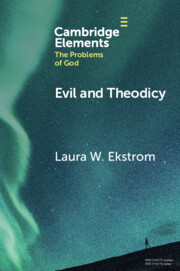Element contents
Evil and Theodicy
Published online by Cambridge University Press: 16 January 2023
Summary
Information
- Type
- Element
- Information
- Series: Elements in the Problems of GodOnline ISBN: 9781009293075Publisher: Cambridge University PressPrint publication: 02 February 2023
References
Accessibility standard: Unknown
Why this information is here
This section outlines the accessibility features of this content - including support for screen readers, full keyboard navigation and high-contrast display options. This may not be relevant for you.Accessibility Information
- 16
- Cited by
